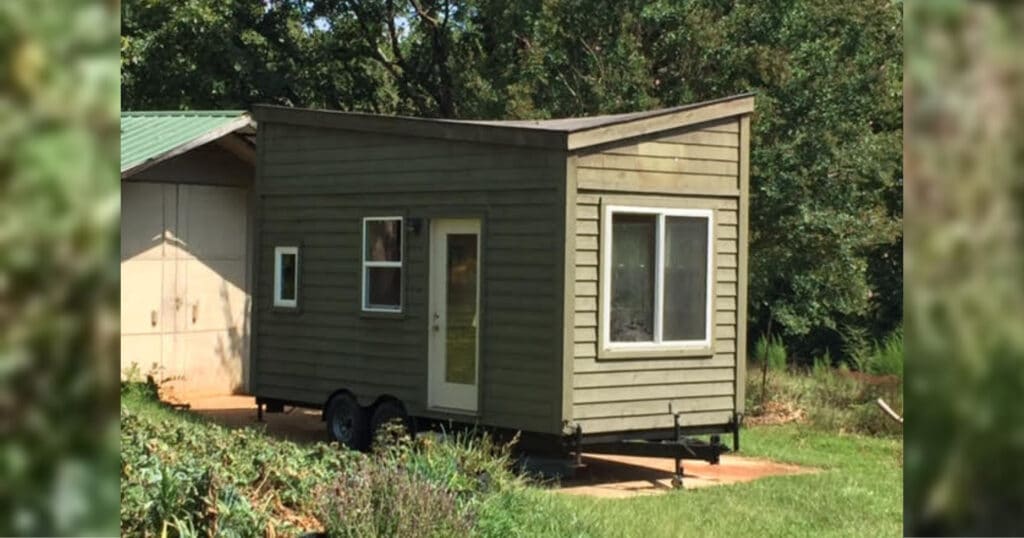South Carolina church’s tiny house project back on track
A small but determined South Carolina congregation is building a “safe house” for an LGBTQ person in need of housing because of who they are. The church’s dream, funded with a Neighbors in Need grant in 2017, is taking time to become reality. But Peace Congregational Church, UCC, in Clemson will not let construction difficulties or COVID-19 stop the completion of its tiny house project.
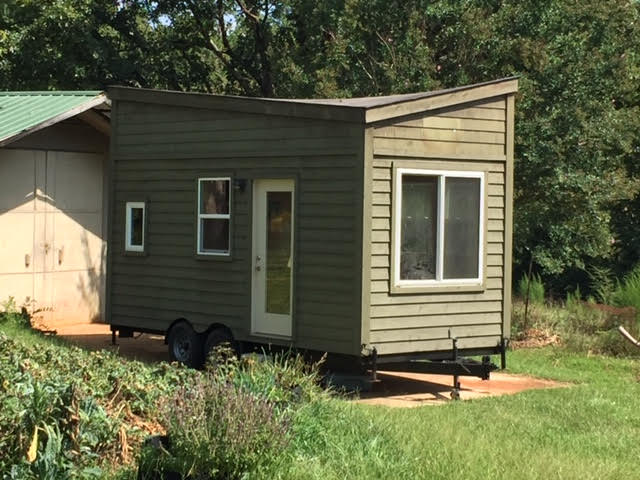
“We are in the Deep South, and LGBTQ individuals are particularly vulnerable in upstate South Carolina, and often experience rejection by friends and family when they come out,” said the Rev. Bruce Schoup in 2017. He was Peace Church’s pastor at the time.
“This project hopes to provide short-term, immediate housing so that the individual or individuals can stay in the community where they feel most secure, in space which they do not need to share, and space that feels special — thus, a tiny house on wheels.”
Despite a few setbacks, the church intends to live into its mission of providing a short-term safe space to a marginalized person. The tiny house is also designed to raise awareness of discrimination against LGBTQ people.
Funding the tiny house
Neighbors in Need, one of the UCC’s five mission offerings, provides grants to UCC churches and organizations to support ministries of justice and compassion around the country. There are three tiers of grants available:
- Direct Service grants ($1,000 to $3,000) provide funding to meet the immediate needs of an individual or group.
- Advocacy grants ($3,001 to $5,000) assist communities that wish to change policy on a state or federal level via an advocacy campaign.
- Grass Top grants ($5,001 to $10,000) seek to award uniquely innovative programs that can be replicated in other settings.
Peace Church received one of the program’s first Grass Top grants. That $10,000, with other grants and donations, will pay for the project.
The church got an additional $5,000 from the UCC Southeast Conference shortly after receiving the NIN grant, said Russ Stanton, church treasurer. “We have received about $10,000 in additional donations from church members and local people,” he said. “We believe that this will be enough to complete the tiny house.”
Grant creates momentum
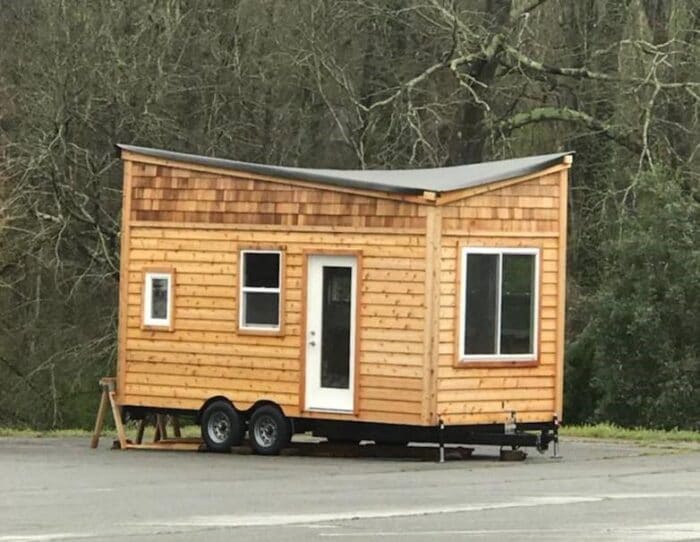
“The grant from NIN spurred us to seek the grant from the Conference, which supported two student interns, one who was an architecture major who drew the original tiny house plans and a second who served as our volunteer coordinator,” said Jody Usher, Peace Church’s former moderator.
“We secured a building spot in the South Carolina Botanical Garden parking lot, located next to the Clemson University campus. Much of the initial work involved student volunteers alongside a local builder who contributed leadership, tools and skills.”
The church team and partners from the Clemson University student ministry, PRISM, got the exterior built, but ran into challenges in 2018 that slowed its progress.
Overcoming obstacles
First, when the Botanical Garden renovated the parking lot, Peace Church had to relocate the tiny house.
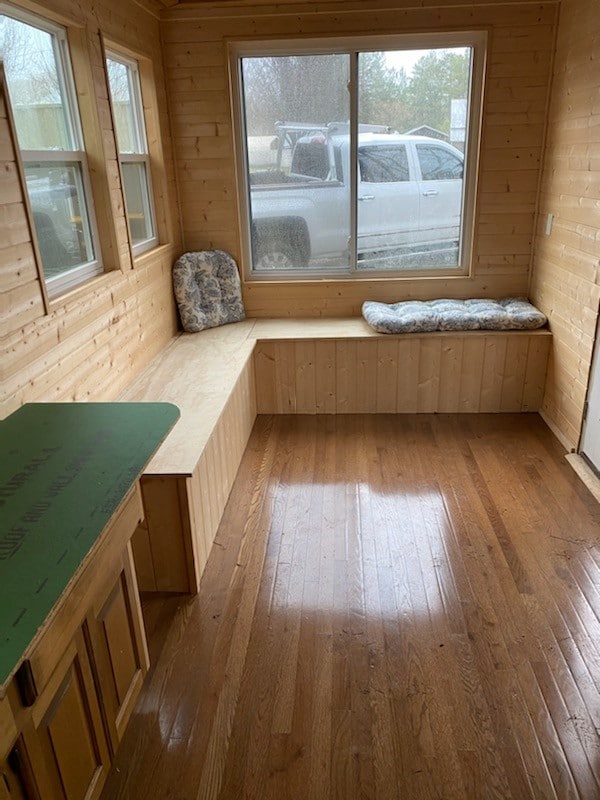
Then, though one of the volunteers offered to host it on his property, that location was further from church and the Clemson campus. So Usher said it became harder to recruit other volunteers.
Finally, when Schoup departed to take another call, the project lost his leadership and enthusiastic energy. Stanton stepped in to manage the interior construction, but the job hasn’t been easy.
“The inside construction required more specific skills which students and church members lacked, such as electrical and plumbing,” Usher said. “Finding individuals who had the requisite skills in that period of the building boom was difficult. Then came COVID-19.”
New location found
The tiny house project stalled for a while during the pandemic, but Peace Church didn’t give up.
“In mid-August we identified a new location for the tiny house, on a farm that is active in collaborative living,” Usher said. “The owner, a member of a local food co-op that one of us belongs to, met with two men from our church and liked the vision Peace Church has for the tiny house.”
The house moved to Startooth Farm last weekend. Plans for the interior layout are complete and construction should be finished before the end of the year.
‘God got involved’
Usher said the original builder, Jon Andrews of Mirror Image Design and Remodeling, will work to help get it done by finding a plumber to finish the kitchen and bathroom. “Seemingly, prayers have brought us a retired RV electrician who agreed to contribute his expertise in upgrading the electrical panel and completing the work.”
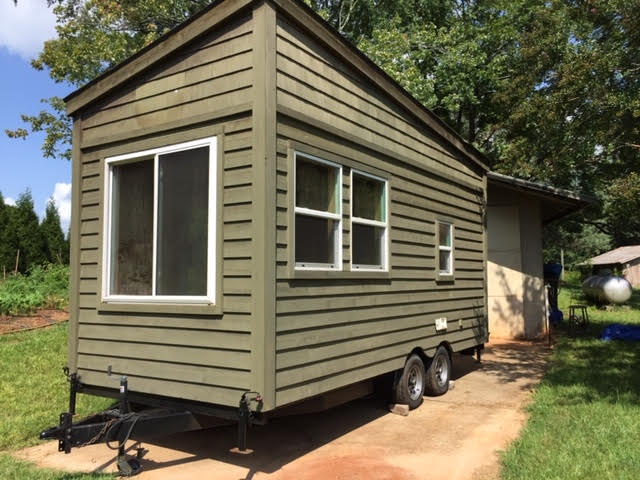
The Peace Church team is already putting feelers out to find the tiny house’s first occupant.
“Organizations that were partnering with us pre-COVID are no longer in place, yet South Carolina upstate continues to have significant LGBTQ+ needs for emergency housing and more,” Usher said. “We are currently in new conversations with a local organization that serves the trans community called Gender Benders that has expressed recent interest in partnering with us.
“We are thankful God got involved in this and we are on the move.”
Most churches will take the Neighbors in Need offering on World Communion Sunday, Oct. 3. Online donations can be offered here. Grant applications, with an Oct. 1 deadline, are available here.
Related News
A Prophetic Call for Justice and Peace in Palestine
The executive leaders of the United Church of Christ have issued the following statement...
Read More‘Love is Greater Than Fear’: Regional Youth Events get to the heart of gospel message
United Church of Christ teens attending this summer’s Regional Youth Events (RYE) are...
Read MoreUCC desk calendars available to order now
Prepare for your day, month and year with the United Church of Christ desk calendar —...
Read More